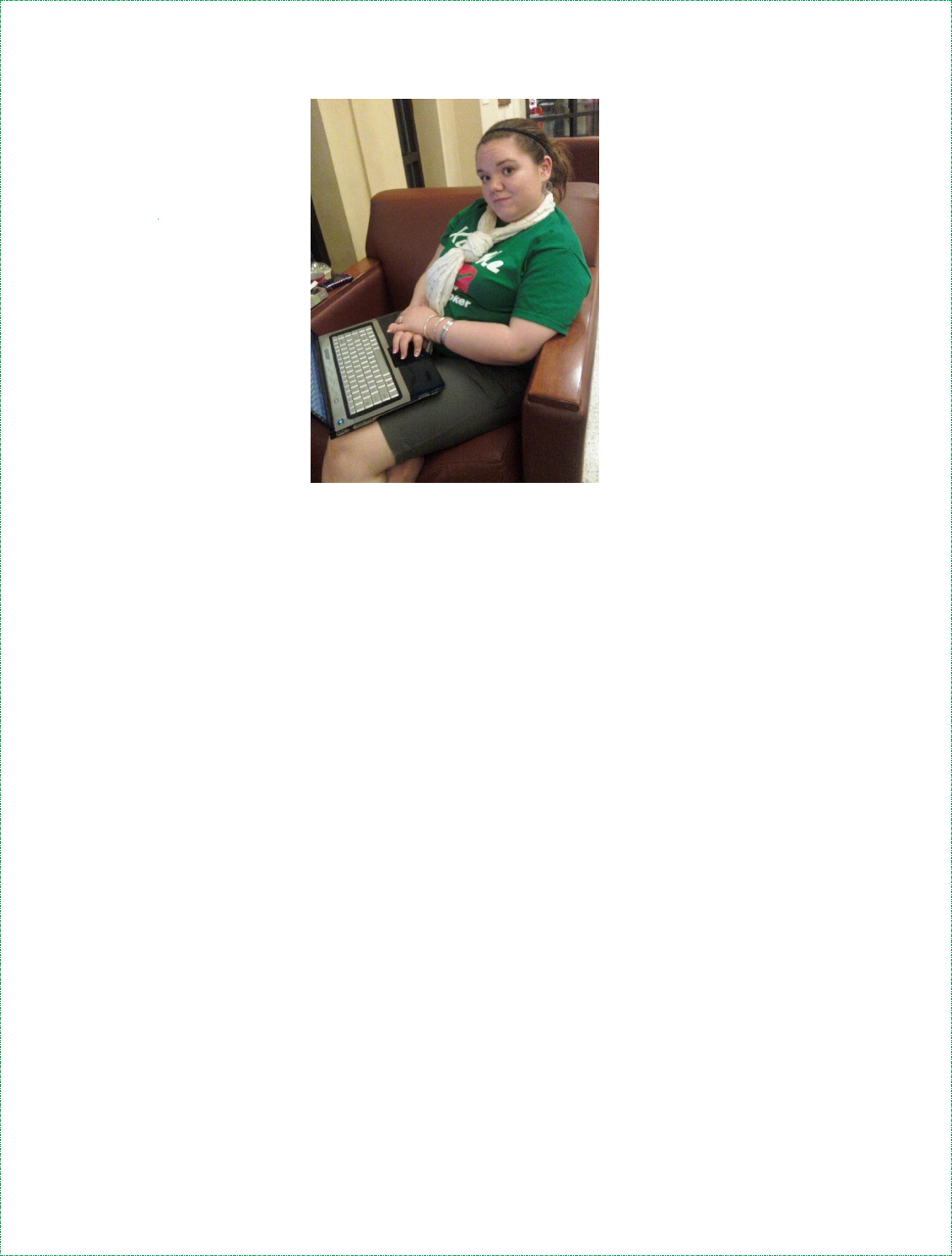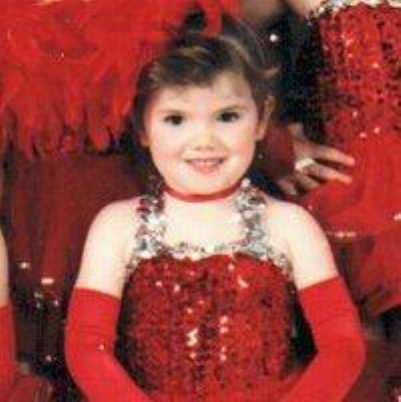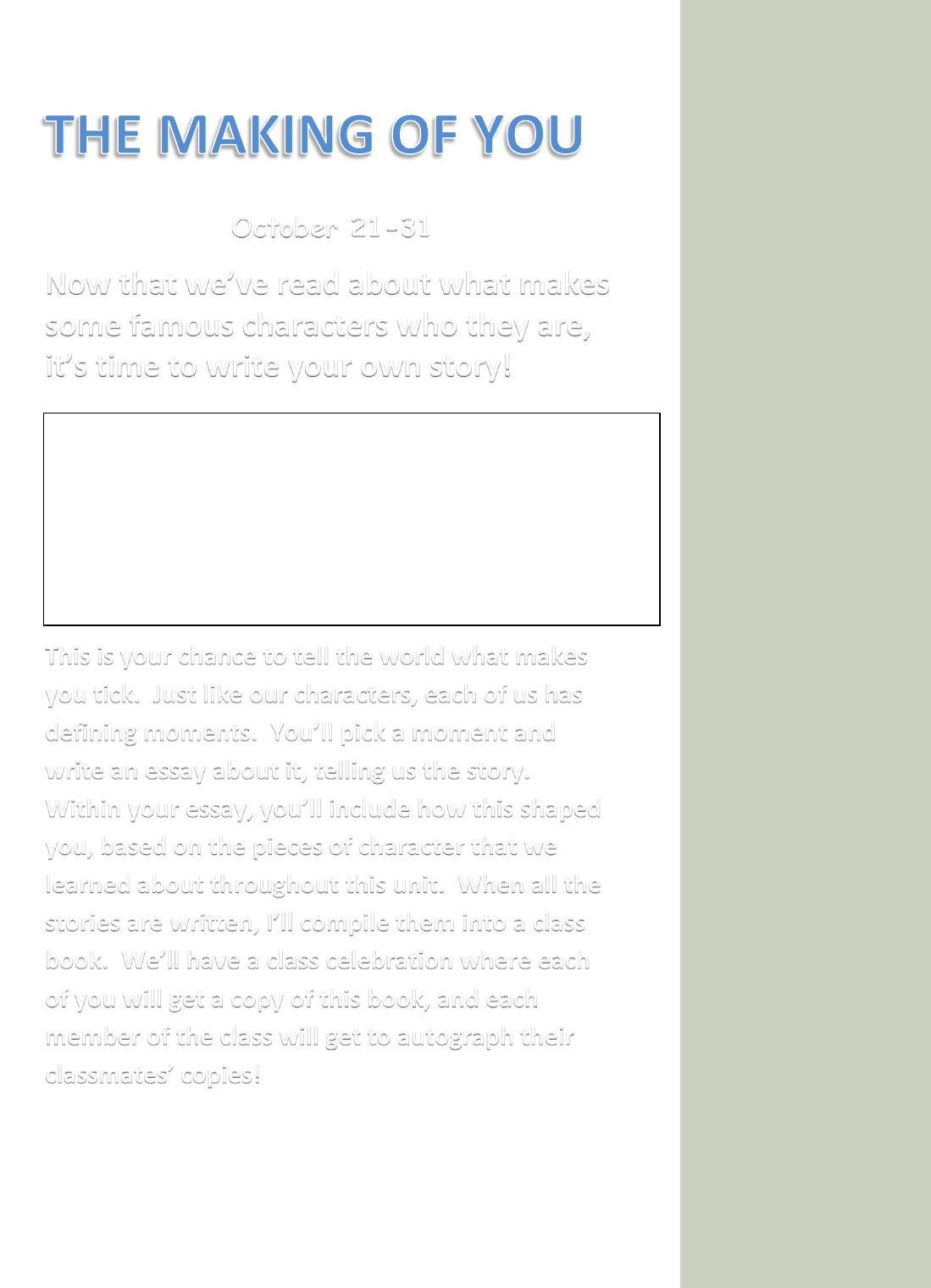
My name is Rebecca Stiles, and I am a pre-service high school English
teacher. Growing up, I loved to read and write. It has always fascinated me that,
through literature, it is possible to enter countless new worlds. It is even possible
to be the creator of a new world. English plays a vital role in the education
system for two reasons. First, it is essential for productive citizens to be able to
communicate through writing. Second, reading literature teaches empathy,
shows students from any home environment, the importance of compassion, of
being able to see a situation through the eyes of another individual. And this is
something society today hungers for. This is how literature can make a
difference, and how I plan to teach my students that they can make a difference.
“Education is what remains after one has forgotten what one has
learned in school.”
-Albert Einstein

Born Teaching:
The Life of a Growing Teacher
“A book is the only place in which you can examine a fragile thought without breaking it,
or explore an explosive idea without fear it will go off in your face. It is one of the few
havens remaining where a man’s mind can get both provocation and privacy.”
-Edward P. Morgan
A girl of about 4 years old sits on the floor of her bedroom with her Barbies and their
pink house. One Barbie stands in front of all the other dolls and shows them what each letter is,
telling them the name and what sound it makes. Teacher Barbie
makes the Kellys and Stacies repeat what she has taught them, and
they do it over and over and over again until they get it right. Now
this is a girl who is excited to start school in the fall!
That child was me. I would only play with my dolls if I
could use them to play teacher. And that was only an option when
my mom or little cousin weren’t around to be bullied into being my
students. My mother would sit in front of me and let me teach her
the alphabet or addition or whatever else I had learned recently. She had to sit in my four-year-
old’s chair of course, so that I could be the teacher, not her. (She was a really good sport about
the whole thing, even if she had to stay in from pretend recess for laughing when the teacher
talked.)
My cousin never wanted to sit still for me to teach him. He was four years younger than I
was and had ADD, but Nicky would do anything to get to play with me. I taught him how to
follow behind me in the house parade – he had to stay two steps back and march in time with my
music. When he did something I didn’t approve of, he was thoroughly scolded. He wasn’t
allowed to run or yell. And in the end, I helped him with his reading when he started school.
Fast forward a few years to the fifth grade. I was in the gifted class that met one day a
week, but the rest of the week I always finished my class work early. My friends knew that if
they needed help with something, they could turn to me to help them figure it out. Soon enough,
Mrs. Muzzey figured this out, too. She saw that I could sometimes say something a different
way and help my peers to understand better than they had with her help. For the rest of the year,
when I would finish my work, she would ask a few of my friends if they needed extra help. If
they agreed, they would go sit out in the hallway with me where we could work together. Many
kids would have hated this, but I ate it up. I loved being able to help my friends understand
something they were struggling with. And my friends valued me more for it, too.
As I grew, there was only one thing I ever wanted to be: a teacher (except for once,
briefly, when as a five year old I wanted to be an astronaut. I quickly remembered my fear of
heights). Teaching was the only thing I ever considered. I’d been telling people what to do and
showing them how to do it all my life. When I started filling out college applications, teaching
was the only thing I could think of that I even thought I would like to do.
I still feel the same way. Reading has always been my favorite pastime, so it’s no
wonder that I will teach high school English. I love being dumped into a new world when I start
a new book, having withdrawals from a great book’s world when I finish it. Reading is
important. It is only through books that any person can have the opportunity to examine the
thoughts of a person who is their opposite, to think in a truly radical new way without anxiety.
Through reading, I have learned empathy; I have learned that the feelings of others matter. I
have learned countless things about different places, people, or religions. Reading teaches what
it means to be human. And this is what I want to pass on to my students. Walking into my
classroom will be like walking into a new world each day. Life is always about what new people
you meet and what new interests you can develop; why should a classroom be any different?
Upon entering my classroom, there will be walls covered with bookshelves. These are
filled with books of all genres and interests. I have collected them ever since I started my job as
a cashier at a Barnes and Noble. I get an employee’s discount, and I use it to make sure I’ll have
a book to suit each individual I meet. Not finding a book that holds individual appeal will not be
an excuse in my classroom. I have so many different topics, there’s one to appeal to every
person! There will also be a wall in my room filled with the work of my students. I value
creativity, and offer many creative assignments. When a student does well, I will make sure it is
seen.
What’s important to me is that I can teach every individual I encounter something about
being a person, something that makes him or her think. I want all students to question their
behavior during each human interaction they have. Maybe they’ll consider why that girl was
glaring, instead of making a comment about her x-ray vision. And maybe along the way I can
pass on to each student that reading is important. So that no one will ever tell a cashier at a
Barnes and Noble, “Oh no…I don’t read.” Even if I can’t teach all of my students what it means
to love literature, I hope they can leave their time with me with the knowledge that words are
valuable, that reading is more than just letters thrown together on a page to give somebody a
headache. I hope I can impart that sometimes it’s only through an imitation of life that we can
learn anything at all about what it means to live.

Overview
Unit: Characterization in Literature
Class: Intro to Literature
Teacher: Becky Stiles
Semester: Spring 2013
Rationale: This unit is essential to every student’s education. When reading a novel (or
watching a movie, etc.), it is extremely important that each individual is capable of deducing
things about and understanding the characterization of the characters presented. Even more
important, through learning to understand characterization in fiction, students can learn to look at
those around them and see them as well-rounded people, with events and circumstances leading
up to present behaviors and life choices. In learning about characterization, my students will
learn to be more empathetic citizens.
Summary: In this unit, my students will each read one of four pieces of classic literature based
on their reading levels and complete lessons each day to help them explore the characterization
present in these readings. After completing the novels, they will be put into jigsaw groups (one
from each group), and explore similarities and differences between characterization of different
characters. Finally, they will explore characterization in their own writing. The unit will
culminate in a book of the class’ characterization pieces; each student will receive a copy of the
book, and they will be given an opportunity to sign their piece in their classmates’ books, giving
them a chance to learn about their classmates and form a better community.
Essential Questions:
1. What are the essential components of character?
2. How do the components of character relate to other pieces of what makes up a story?
3. How does your character affect your life? What components of your life have most
affected your character?
Objectives:
CCSS.ELA-Literacy.RL.9-10.3 Analyze how complex characters (e.g., those with multiple or
conflicting motivations) develop over the course of a text, interact with other characters, and
advance the plot or develop the theme.
CCSS.ELA-Literacy.W.9-10.3 Write narratives to develop real or imagined experiences or events
using effective technique, well-chosen details, and well-structured event sequences.
CCSS.ELA-Literacy.W.9-10.3b Use narrative techniques, such as dialogue, pacing,
description, reflection, and multiple plot lines, to develop experiences, events, and/or
characters.

CCSS.ELA-Literacy.W.9-10.3d Use precise words and phrases, telling details, and
sensory language to convey a vivid picture of the experiences, events, setting, and/or
characters.
CCSS.ELA-Literacy.W.9-10.3e Provide a conclusion that follows from and reflects on
what is experienced, observed, or resolved over the course of the narrative.
CCSS.ELA-Literacy.SL.9-10.1 Initiate and participate effectively in a range of collaborative
discussions (one-on-one, in groups, and teacher-led) with diverse partners on grades 9–10
topics, texts, and issues, building on others’ ideas and expressing their own clearly and
persuasively.
CCSS.ELA-Literacy.SL.9-10.1a Come to discussions prepared, having read and
researched material under study; explicitly draw on that preparation by referring to
evidence from texts and other research on the topic or issue to stimulate a thoughtful,
well-reasoned exchange of ideas.
CCSS.ELA-Literacy.SL.9-10.1d Respond thoughtfully to diverse perspectives, summarize
points of agreement and disagreement, and, when warranted, qualify or justify their own
views and understanding and make new connections in light of the evidence and
reasoning presented.
Length of Unit: approximately 4 weeks
Materials and Resources:
School: 5-8 copies each of To Kill a Mockingbird, The Outsiders, The Adventures of
Huckleberry Finn, and The Great Gatsby, computers for students to work on
Teacher: worksheets and assignments for students, finished books
Students: writing utensils, notebooks for journaling and documenting lessons
Literacy Strategies:
Literature circles
Write-arounds in original novel groups
Daily tickets to enter (written in the first five minutes of class)
Creating a Facebook page about the main characters of each novel
Action!
Assessments:
Pre-assessment: silent discussions in groups transitioning to class discussion about what
makes a person in a book or movie into a character
Formative assessments:
o Daily tickets to enter
o Worksheets about characters while reading, to be completed in groups
o Small group write arounds
o Mad libs
o One day acting – in groups, act out the situation as it has happened so far as the
characters themselves
o Create a facebook page about the main character
o Write a story about how the character will react in a new situation – trade with a
partner and write about how the story would change the character afterwards
o One-word write around in jigsaw groups about what affects character; transition
to group discussion, then into one page journal writing about similarities found
Summative assessments: Write a story about an event that shaped your character.
Included should be a section explaining how it changed your character: what other areas
of your life were affected? Rubric will be provided.

Day 1
Monday
Introduce Topic: Importance of Character in the Novel
Students seated by what book they will read.
One word at a time silent discussion about aspects of character.
Exit slip: what part of a character do you think is the most essential?
Day 2
Tuesday
Transition silent discussions into class discussion, culminating in class list
Decide which ideas students are and are not aware of, then get more info about
things they do know – add to class list
Pass out books and give first reading assignment (first two chapters)
Exit slip: judging from the cover of your book, describe who you think your main
character will be
Day 3
Wednesday
Ticket to enter: What aspects of your character do you like? Hate? Who does he
remind you of?
Seated in groups by what they are reading
Each group completes a worksheet about the novel so far, focusing on giving
character traits and coming up with textual examples to back up what they’ve
said
Assign next reading (approx. to pg 60)
Exit slip: How does the character react to the setting? To the plot?
Day 4
Thursday
Ticket to enter: What other characters have you met? Describe at least 3
physical characteristics of two of them.
Mad libs: use physical characteristics of characters to answer fill-in-the blank
mad libs story
Assign next reading (to pg 90)
Exit slip: Which of the characters in your novel do you identify with most? Why?
Day 5
Friday
Ticket to enter: What does the main conflict of the novel seem to be? What does
this have to do with the main character? How does the character relate to what’s
happening?
Group takes first ten minutes of the class to predict what will happen next in the
novel.
Next step: Each student writes about how they think the character will
react/participate in what the group decided will happen (20 min)
10 mins to compare/contrast answers
Assign next reading (to page 120); if not finished with story, finish it over
weekend
Exit slip: what similarities came up in your group? How does this work
with/against emotional reactions the character has already had?

Lesson Plan: Mad Libs Physical Descriptors Becky Stiles
Intro to Literature
Character Unit 1 Day
Rationale: Character includes the physical aspects and appearances of the person. This activity
shows how physicalities of a character can influence feelings about and perceptions of a
character, and as a consequence, helps students challenge the importance of physical qualities
in people they know.
Objectives:
CCSS.ELA-Literacy.CCRA.R.1 Read closely to determine what the text says explicitly and
to make logical inferences from it; cite specific textual evidence when writing or
speaking to support conclusions drawn from the text.
Materials and Resources:
School: overhead projector or smartboard
Students: pencils and journals
Teacher: Mad libs worksheet, classroom copy of worksheet
Phase One: Ticket to enter. Students list physical characteristics of 2 main characters
individually, then compare within groups .
Phase Two: Students fill out a “mad libs” word list (ex.: “color of hair,” “most obvious physical
flaw,” etc.), then put those answers in corresponding blanks in a fill-in-the-blank story which
uses humor to illustrate how trivial these details can seem.
Phase Three: The class comes together and uses answers from their different novels to fill in
the same story. Groups will take turns answering questions, so that the new class creation
contains pieces of characters from multiple novels. The class will then reflect in their journals
about how this changed what happened in the fill-in-the-blank story. Exit slip.
Homework Assignment: Continue reading
Relation to Summative Assessment: Physical qualities about a character are very important to
the perception of and life of the character. Many students may have a significant experience in
their lives that has to do with physical appearances, so this activity gives students a chance to
explore their importance.

Lesson Plan: Action! Teacher: Becky Stiles
Intro to Literature
Character Unit 1 day
Rationale: Now that students have started reading their novels, it is time to help them get into
the heads of the characters! This lesson allows students to show off what they have learned
about the characters thus far, and forces them to use their knowledge about the characters in a
new and interesting way.
Objectives:
CCSS.ELA-Literacy.RL.9-10.3 Analyze how complex characters (e.g., those with multiple
or conflicting motivations) develop over the course of a text, interact with other
characters, and advance the plot or develop the theme.
CCSS.ELA-Literacy.SL.9-10.6 Adapt speech to a variety of contexts and tasks,
demonstrating command of formal English when indicated or appropriate.
Phase One: Ticket to enter. Introduce concept of acting to students. Explain informal nature,
more about trying than being great
Phase Two: Acting! Each student chooses one character, and the students work together to
act out what has happened so far. Teacher walks around room, observing, and making sure
students stay on task.
Phase Three: Close curtain on acting. Congratulate students on job well done. Exit slip.
Homework Assignment: Continue reading
Relation to Summative Assessment: By getting students in the heads of their characters, they
are forced to think about how events affect characters and how characters affect the events.
In the summative assessment, the students will be asked to step back from their own lives, to
look at it and see what most affected who they are. This exercise prepares the students for
this look.

Lesson Plan: Sharing Stories Teacher: Becky Stiles
Intro to Literature
Character Unit Length of Lesson: 1 and a half weeks
Rationale: Throughout the length of the unit, students have grown to understand the
components that make up a character. This lesson utilizes this knowledge of character and
hones writing skills by allowing the students to look through their personal experiences to
discover what has influenced their personal character, forming a connection between literature
and students’ everyday lives.
Objectives:
CCSS.ELA-Literacy.W.9-10.3 Write narratives to develop real or imagined experiences or events
using effective technique, well-chosen details, and well-structured event sequences.
CCSS.ELA-Literacy.W.9-10.3b Use narrative techniques, such as dialogue, pacing,
description, reflection, and multiple plot lines, to develop experiences, events, and/or
characters.
CCSS.ELA-Literacy.W.9-10.3d Use precise words and phrases, telling details, and
sensory language to convey a vivid picture of the experiences, events, setting, and/or
characters.
CCSS.ELA-Literacy.W.9-10.3e Provide a conclusion that follows from and reflects on
what is experienced, observed, or resolved over the course of the narrative.
CCSS.ELA-Literacy.W.9-10.5 Develop and strengthen writing as needed by planning, revising,
editing, rewriting, or trying a new approach, focusing on addressing what is most significant for a
specific purpose and audience.
Materials and Resources:
School: computers
Students: paper, pens
Teacher: bound books of stories
Literacy Strategies:
Quick write
Peer reading and feedback
Phase One: Students have a quick write session in which they journal about what events in
their lives have affected their character. Students then pick top 3 instances, and write further
about each of those. They will finally utilize these writings to discover which event they’d like
to write about.
Phase Two: Writing! Students spend three class periods in the lab, writing their stories. Day 3
will be dedicated to their analysis of how it affected them. Two days of peer workshops will
follow, and then a final draft will be due.
Phase Three: The teacher will make a class book on character out of the students’ essays.
Within the book, the students’ names will be missing, and the students will have a “character
party” in which they will sign their stories in the other students’ books.
Homework Assignment: During length of lesson, students should work on writing as necessary
outside of class.
Relation to Summative Assessment: This is the summative assessment for the unit.

October 21-31
Now that we’ve read about what makes
some famous characters who they are,
it’s time to write your own story!
This is your chance to tell the world what makes
you tick. Just like our characters, each of us has
defining moments. You’ll pick a moment and
write an essay about it, telling us the story.
Within your essay, you’ll include how this shaped
you, based on the pieces of character that we
learned about throughout this unit. When all the
stories are written, I’ll compile them into a class
book. We’ll have a class celebration where each
of you will get a copy of this book, and each
member of the class will get to autograph their
classmates’ copies!
Phase 1:
October 21-23
Brainstorming! We’ll
spend a few days pre-
writing and coming up
with ideas about what
event you’d like to write
about.
Phase 2:
October 24-25
Writing. We’ll head to
the computer lab and
write!
Phase 3:
October 28-31
Post-writing – After the
hard part’s done, we’ll
read each other’s work,
revise and finish off
with a PARTY!
“When a defining moment comes along, you
define the moment or the moment defines
you”
-actor Kevin Costner
